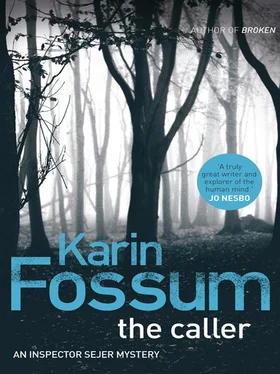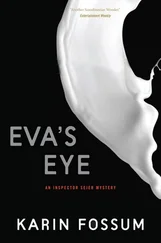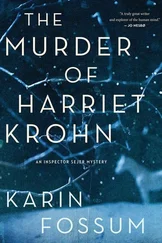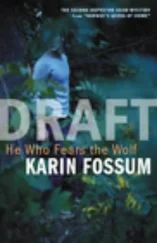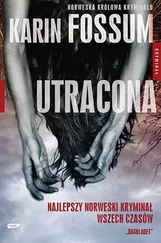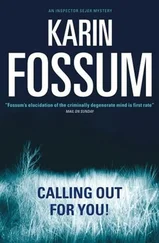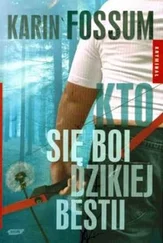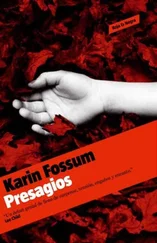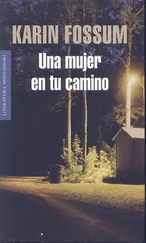Ask Britt , it said.
He opened the door and went in, continued cautiously to the till, to two girls sitting idle and staring at him with large, round eyes.
Afterwards, when he considered it, he thought the two girls had acted strangely. The simple question, Could you get the gloves? had led to an incomprehensible commotion. They opened their eyes wide. They exchanged glances. One disappeared immediately into the back room, and she took her time. The other went outside, walked aimlessly around the car park as though searching for something. Now and then she stopped and glanced about, puzzled, as though something was missing. She’s looking for the moped, he realised. I’ll be damned. Perhaps there was a reason for the empty petrol tank. The other one finally came back, and gave him the gloves. He slipped out the door and bolted as fast as he could, heading towards Bjerkås.
Again he thought about the dream he’d had. The fun might soon be over, he thought, they’re on my trail. Maybe I have to do something spectacular while there’s time.
One way or another.
Then he walked all the way to Rolandsgata. In the sunshine and the mild late-summer breeze, surrounded by ditches with wild flowers and green meadows. It took an hour. As he went, he hummed a song, ‘Hermann is a Cheery Fellow’. When he arrived, he called through the house.
‘Didn’t you ride your moped?’ Henry Beskow asked. ‘I didn’t hear it.’
He explained that the tank was empty. He said it in a light, indifferent way, because he wasn’t the kind of person to beg, and he had good legs to walk on.
‘I’m pretty fit,’ he said. ‘And it’s good to walk sometimes.’
‘Out in the shed there’s an old plastic canister, Johnny. You can fill it with petrol. Then take some money from the glass jar in the kitchen. You’ve got to have your moped, it’s important that you can get around.’
Johnny took care of food and drink. He buttered slices of bread and mixed squash in a jug, carried them into the lounge and set them on the table with the two-handled mug. Then he had a thought. As usual, it was boiling hot in the room. He went to the windows; both were closed. He examined them carefully, traced the sill with a finger. Squinting out at the road, he was blinded by the low sun.
‘You need fresh air,’ he said.
‘Can’t,’ the old man protested. ‘The wasps.’
Johnny turned and looked at him. He wanted to be the boss, so he stood tall and crossed his arms. ‘I’ll call a carpenter. We’ll get him to put in one of those insect screens. One for each window. Then they can stay open all summer. You’ll be fresh and clear-headed, not heavy and sluggish like you are now.’
‘So that’s what you think now, eh?’ grumbled Henry.
‘Have you got one of those folding rulers? I’ll take measurements.’
His grandfather told him to look in a kitchen drawer. The folding ruler was old and sturdy. He measured both windows twice, noting the figures on a sheet of paper.
‘Ninety-eight by one hundred and ten,’ he said cheerily. ‘I’ll find a carpenter in the phone book.’
‘Ask what it costs,’ Henry said. ‘Can you bargain?’
‘I’ll tell them you’re retired.’
Johnny riffled through the Yellow Pages and found a carpenter who lived in the area. He explained the situation and they agreed on a price and a time for him to come and install the screens.
‘If everyone were like you, Johnny,’ Henry said contentedly, ‘this world would be a better place.’
Johnny patted him on his nearly bald head. ‘I know. I’m a man of action.’
They talked about this and that, as was their routine, and a few afternoon hours passed quickly. Because he had so much care, Henry felt spoiled, and Johnny felt indispensable. ‘It’s us against all the rest of them,’ he told Henry.
Johnny carried the mugs and plates to the kitchen and put them on the worktop. He found the plastic canister in the shed, walked down to Bjørnstad Centre and filled it up. As he walked back across Askeland with the heavy can in his hand, he fantasised. His mother would look up when he entered, perhaps from her knitting, smile and say, There you are, how lovely. I’ve waited so long. Are you hungry? Can I make you something to eat? What do you feel like eating, Johnnyboy?
He liked this fantasy, so he continued to let his thoughts wander.
I’ve baked you a kringle, she might say. It’s cooling on a rack on the worktop.
With almonds and sugar on top.
Let’s have a nice, quiet evening at home together.
When he was finally home after his long walk — the ten-litre canister had made his right arm numb — he filled the moped tank. Draining the can properly was difficult.
He heard it splash at the bottom, probably only a drop left. Thoughts of the sweet kringle were swept away and replaced with bitter ones. If she’s lying on the sofa pissed, he thought, I’ll pour the rest of the petrol on her head and light it.
My mother in flames, he thought.
The smell of grilled hyena spreading over Askeland.
He went inside the house.
There was nothing on the stove, and no hot, sweet kringle cooling on a rack.
He headed into the lounge and stood stock-still in the door frame, staring. His mother sat on the sofa, the tension between them palpable as humidity in the air.
‘What do you want?’ she said. ‘Been with the old man, I imagine. What did you get out of him today?’
He lowered his head. She was right: his grandfather had given him money. But he hadn’t begged for it. He had only mentioned the empty tank, had said it without complaint, as an explanation.
‘Don’t stand there gawking, it makes me nervous. Do you know you have a piercing stare? Go to your room.’
Johnny did as his mother told him. In his room he took Butch from his cage, lay down on his bed and closed his eyes, letting the hamster crawl across the duvet on its tiny, fast feet. Low sounds reached him from the kitchen. Maybe she had started dinner. He heard drawers and cupboards opening, and footsteps shuffling back and forth. The clatter of cutlery. Well, he thought, the hyena is scraping a meal together. Another thought slithered through the silence into his room, an evil and shrewd one. The police were right behind him now, so it was important to exploit the time he had left. He listened to all the noises in the kitchen, noticing how she paced from the kitchen to the lounge and back. She kept busy, turning on the taps, slamming cupboard doors. Finally, after twenty minutes, he heard her go into the bathroom. He leapt quickly from the bed and opened a drawer in his chest of drawers. The box of rat poison was hidden behind an old T-shirt. He removed the lid and studied the pink grains. You would think the grains looked tasty, if you didn’t know any better — that is, if you didn’t know they were deadly. Keeping his ear trained on the bathroom, his listened for his mother. I’ll have to act fast, he thought, while I’m at my most vicious. While I don’t care what’s happening, either about the night ahead or tomorrow — to hell with the consequences. He tiptoed into the kitchen. A saucepan simmered on the hob. On the worktop next to it was a wooden spoon. The meat and vegetables in the pan were mixed in a dark sauce. He drained the entire box of rat poison into the pan and stirred it around, until it was absolutely impossible to see the minuscule grains. This will be interesting, he thought. He stuck the empty box under his pullover and ran back to his room. The entire operation had taken only a few seconds. When he heard his mother leave the bathroom, he slipped into the hallway and opened the front door, his cheeks flushed.
She heard him and immediately stepped into the hallway. ‘So,’ she said, ‘just when I make dinner for us, you leave.’
Читать дальше
